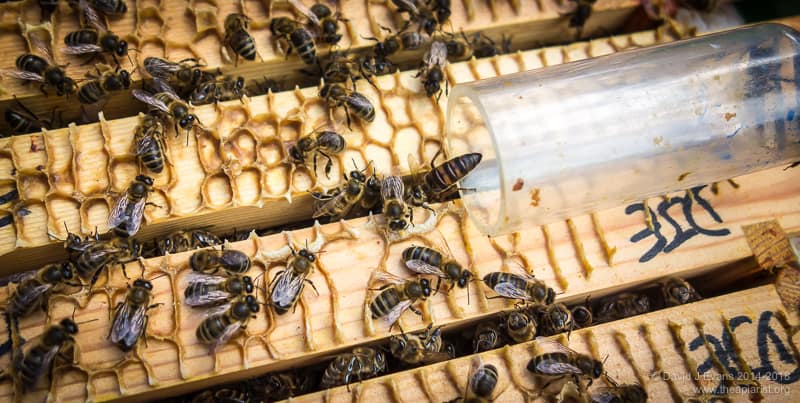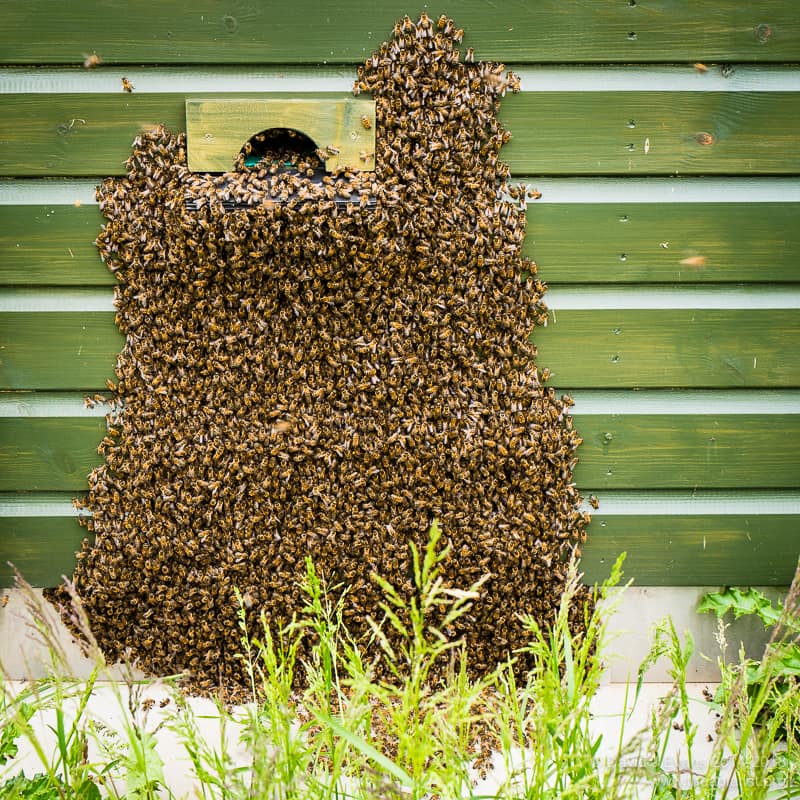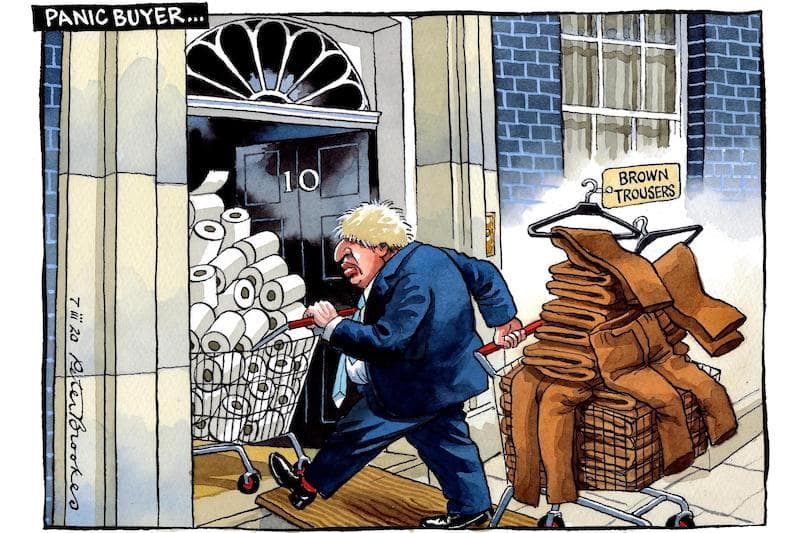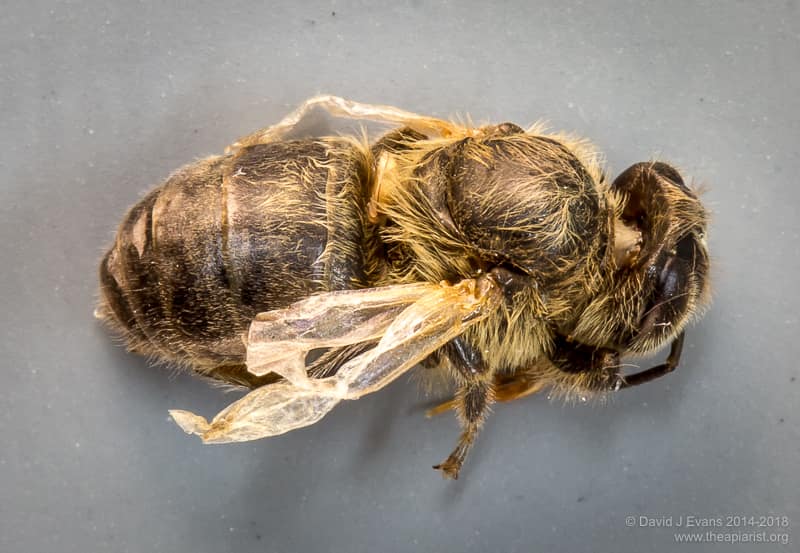Bees in the time of corona
I usually write a review of the past year and plans for the year ahead in the middle of winter. This year I reviewed 2019 and intended to write about my plans when they were a little better formulated.
Inevitably, with the coronavirus pandemic, any plans would have had to be rapidly changed. It’s now not clear what the year ahead will involve and, with the speed things are moving at, anything I write today {{1}} may well be redundant by publication time on Friday.
Nothing I write here should be taken as medical advice or possibly even current information. I teach emerging virus infections and have studied RNA viruses (like DWV, coronavirus also has an RNA genome but it is a fundamentally different beast) for 30 years but defer to the experts when hardcore epidemiology is being discussed.
And it’s the epidemiology, and what we’ve learned from the outbreak in Italy, that is determining the way our society is being restructured for the foreseeable future.
Talking the talk
I gave three invited seminars last week. It was good to see old friends and to meet previously online-only contacts. It was odd not to shake hands with people and to watch people seek out the unoccupied corners of the auditorium to maintain their ‘social distancing’.
All of the beekeeping associations I belong to have cancelled or postponed talks for the next few months. Of course, there are usually far fewer talks during the beekeeping season as we’re all too busy with our bees, but those that were planned are now shelved.
I expect that forward-thinking associations will be looking at alternative ways to deliver talks for the autumn season. If they’re not, they perhaps should as there’s no certainty that the virus will not have stopped circulating in the population by then.
I already have an invitation to deliver a Skype presentation in mid/late summer (to an association in the USA) and expect that will become increasingly commonplace. Someone more entrepreneurial than me will work out a way to give seminars in which the (often outrageous {{2}}) speaker fee is replaced by a subscription model, ensuring that the audience can watch from the comfort of their armchairs without needing to meet in a group.
There is a positive spin to put on this. My waistline will benefit from not experiencing some of the delicious homemade cakes some beekeeping associations produce to accompany tea after the talk 😉 … I’m dreaming thinking in particular of a fabulous lemon drizzle cake at Fortingall & District BKA 🙂
It will also reduce the travel involved. For everyone. It’s not unusual for me to have a 2-3 hour journey to a venue {{3}} and, much as I enjoy talking, the questions, the banter and the cake, driving for 2-3 hours back can be a bit wearing.
At risk populations
Everyone is getting older … but beekeepers often have a head start. In the UK the average age of bee farmers is reported to be 66 years old. In my many visits to beekeeping associations I meet a lot of amateur (backyard) beekeepers and suspect that the majority are the wrong side of 50 {{4}}.
And that’s significant as Covid-19 is a more serious infection for those over 50.
Infection outcomes are also worse for men, and the majority (perhaps 65%) of beekeepers are men. The rates of infection appear similar, but men – particularly elderly men – often have less good underlying health; they are more likely to smoke and have less effective immune responses.
Enough gloom and doom, what does this mean for beekeeping?
Mentoring
If you took a ‘beginning beekeeping‘ course this winter you may struggle to find a mentor. If you’ve been allocated one (or someone has generously volunteered) think twice about huddling over an open hive with them.
Actually, don’t huddle with them at all … the veil of a beesuit is no barrier to a virus-loaded 5μm aerosol.
Mentoring is one of the most important mechanisms of support for people starting beekeeping. I benefitted hugely from the experienced beekeepers who generously answered all my (hundreds of) idiotic questions and helped me with frames of eggs when I’d inadvertently ‘lost’ my queen and knocked back all the queen cells.
Without mentoring, learning to keep bees is a lot more difficult. Not impossible, but certainly more challenging. Beekeeping is fundamentally a practical pastime and learning by demonstration is undoubtedly the best way to clear the initial hurdles.
But thousands before have learnt without the benefit of mentoring.
However, if you can wait, I suggest you do.
If you cannot {{5}}, you need to find a way to compensate for the potential absence of experienced help ‘on hand’.
All of us are going to have to learn to communicate more effectively online. Camera phones are now so good that a quick snap (or video) sent via WhatsApp may well be good enough to diagnose a problem.
Get together (virtually!) with other beginners at a similar stage and compare notes. Discuss how colonies are building up, early signs of swarming and when hives are getting heavier.
Bees in the same environment tend to develop at about the same rate. If your (virtual) ‘bee buddy’ lost a swarm yesterday you should check your colonies as soon as possible.
Getting bees
Thousands of nucs, packages and queens are imported to the UK every year. I’ve no idea what will happen to the supply this season. It might be unaffected, but I suspect it will be reduced.
If you’re waiting for an “overwintered nuc” and your supplier claims now not to be able to supply one {{6}} all is not lost.
Set out one or two bait hives. With isolation, movement restrictions, curfews and illness {{7}} it’s more than likely that some nearby colonies will be poorly managed. If you use a bait hive you can attract a swarm with almost no work and save an overworked beekeeper from having to do a cutout from the roofspace of the house the swarm would have otherwise selected.
At the very least, you can have the pleasure of watching scout bees check out the hive in the isolated comfort of your own garden.
Keeping bees
I think the last few days have shown that the future is anything but predictable. Who knows where we’ll be once the swarming season is here. You can practice swarm control with social distancing in your out apiary unless there are movement controls in place.
In that case, you cannot get there in the first place.
Let us hope that it doesn’t come to that.
What you can do is be prepared. Give the bees plenty of space when the first nectar flow starts. Two supers straight away, or three if your knowledge of local conditions suggests two may not be enough.
Clip one of the wings of the queen. This doesn’t stop the bees swarming (almost nothing does) but it does stop you losing the bees. Although I cannot be certain that queen clipping is painless – because I’m not sure that bees feel pain (evidence suggests they don’t) – I do know that clipped queens have as long and as productive lives as unclipped queens.
Clipped queens buy you a few days grace. The colony tends to swarm when the new virgin queen emerges rather than when the queen cell was capped. That can make all the difference.
The colony swarms but the queen spirals groundwards and usually then climbs back up the hive stand, around which the swarm then clusters. Sometimes the queen returns to the hive, though it doesn’t always end well for her there in the subsequent duel with the virgin now in residence.
Honey sales
Selling honey is not without risk of virus transmission, in either direction. When I sell “from the door” it often involves an extended discussion about hay fever, local forage, bumble bees and the weather. All of that can still continue but both parties will have to speak a bit louder to maintain social distancing.
Selling through shops might be easier … if the shops stay open. Farmers markets, village fetes and country fairs (fayres?) are likely to all be cancelled or postponed, at least temporarily.
There’s a neighbourhood initiative here selling high quality local produce, ordered online and collected at a set date and time. Similar things are likely to be developed elsewhere as customers increasingly want to support local producers, to buy quality food and to avoid the panic buying masses fighting over toilet tissue {{8}} in the supermarkets.
An initiative like Neighbourfood (gone, sadly) might make even more sense if there was a local delivery service to reduce further the need for contact. No doubt these things exist already.
The unknown unknowns
I’ve discussed the unknown knowns previously. These are the things you know will happen during the season, you’re just not quite sure when they’ll happen. Swarming, Varroa management, winter feeding etc.
To add to the uncertainty this year we will have the unknown unknowns … things you didn’t expect and that you might not know anything about. Or have any warning about. Social distancing, quarantine, school closures and potential lockdowns all fall into this category.
Preparing for things that cannot be predicted is always tricky. All we can do is be as resilient and responsible as possible.
My beekeeping season will start in late April or early May. I’m self-sufficient for frames and foundation and can switch entirely to foundationless frames if needed. I have enough boxes, supers, nucs etc {{9}} to maintain my current colonies.
I’m actually planning to reduce my colony numbers which I’ll achieve by uniting weak colonies or selling off the surplus. With a bit more free time from work (and I’m working very remotely some of the time) I intend to rear some queens when the weather is good. These will be used to requeen a few tetchy colonies for research, though it’s increasingly looking like we’ll lose this field season as the labs are effectively closed.
I’m not dependent on honey sales other than to offset the costs of the hobby. If I cannot buy fondant for autumn feeding I’ll just leave the supers on and let them get on with it.
Which leaves only the treatments for Varroa management as essential purchases … and if I cannot mail order Apivar then things have got very serious indeed 🙁 {{10}}
In the meantime, I’m planning some more science and beekeeping posts for the future. This includes one on a new collaborative study we’re involved in on chronic bee paralysis virus which, like Covid-19, is classed as causing an emerging viral disease.
Colophon

Love in the time of cholera
The title is a rather contrived pun based on the book Love in the time of cholera by the Columbian author Gabriel García Márquez. There are no other similarities between this post and the Nobel laureates work … cholera isn’t even a virus.
Cholera, which has characteristic and rather unpleasant symptoms, might be an excuse to panic buy toilet rolls.
Covid-19, which has equally characteristic and unpleasant (but totally different) symptoms, is not 😉
{{1}}: Thursday.
{{2}}: But not in a good way!
{{3}}: Although that’s nothing in comparison to the ‘rock star’ beekeepers like Michael Palmer who regularly fly the Atlantic to talk at meetings here … or used to.
{{4}}: ‘Wrong’ as far as virus infection is concerned. Right in almost every other way … experience, confidence, patience, style and good looks. Well, OK, not necessarily all of those.
{{5}}: And if not, why not?
{{6}}: Hmmm … was it overwintered at all, or was it a box of old bees with an imported queen chucked in shortly before sale? This happens every year. Avoid these sellers like the plague.
{{7}}: I know we don’t have some of these – yet – and I hope everyone stays healthy, but the way we live is changing before our eyes.
{{8}}: Why? Covid-19 is a respiratory infection, not gastrointestinal. It turns out that panic buying is a natural reaction to a loss of psychological control. Which doesn’t make it any less stupid or unsociable.
{{9}}: To start a retail business my wife says!
{{10}}: Though alternatives do exist.






Join the discussion ...